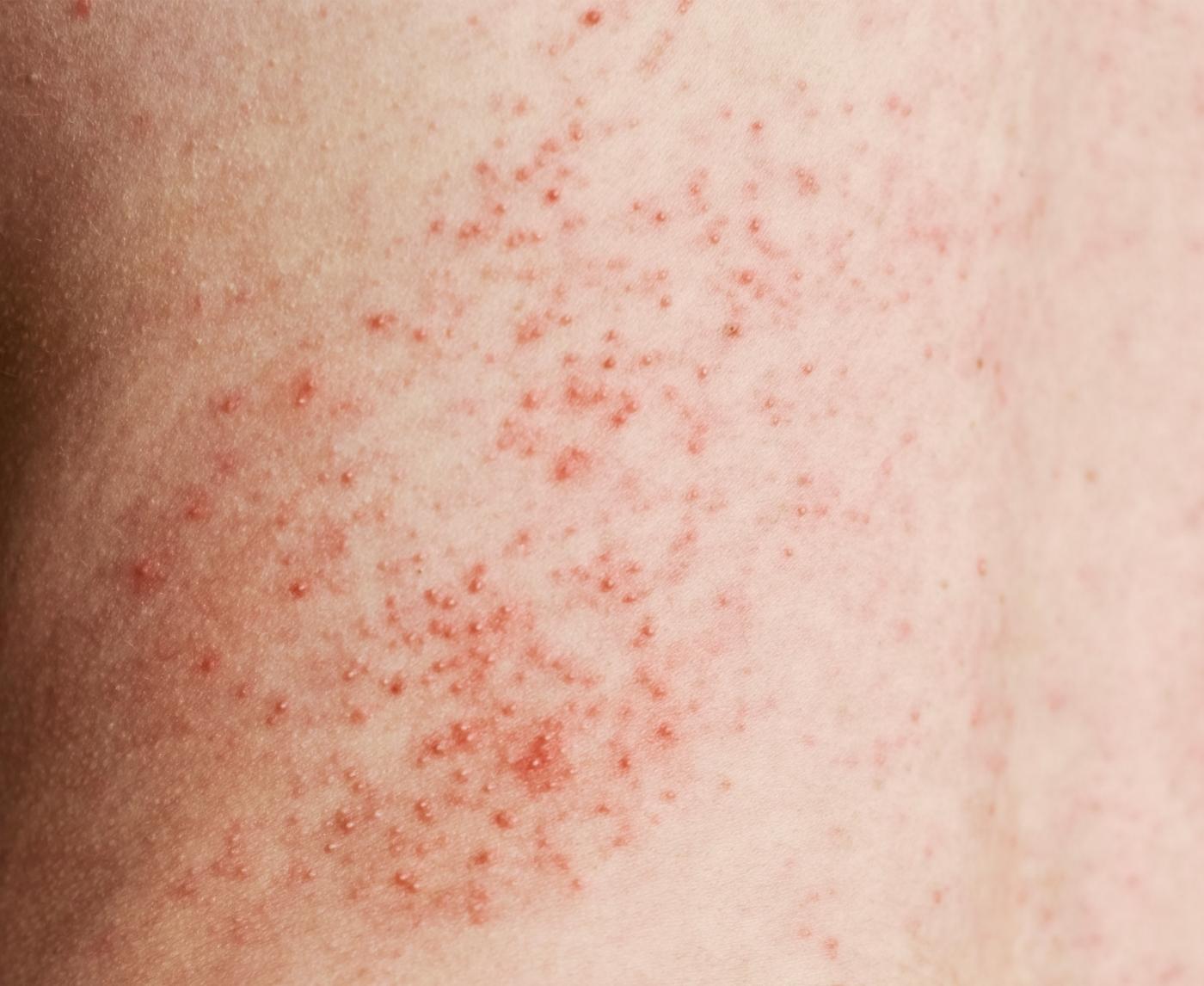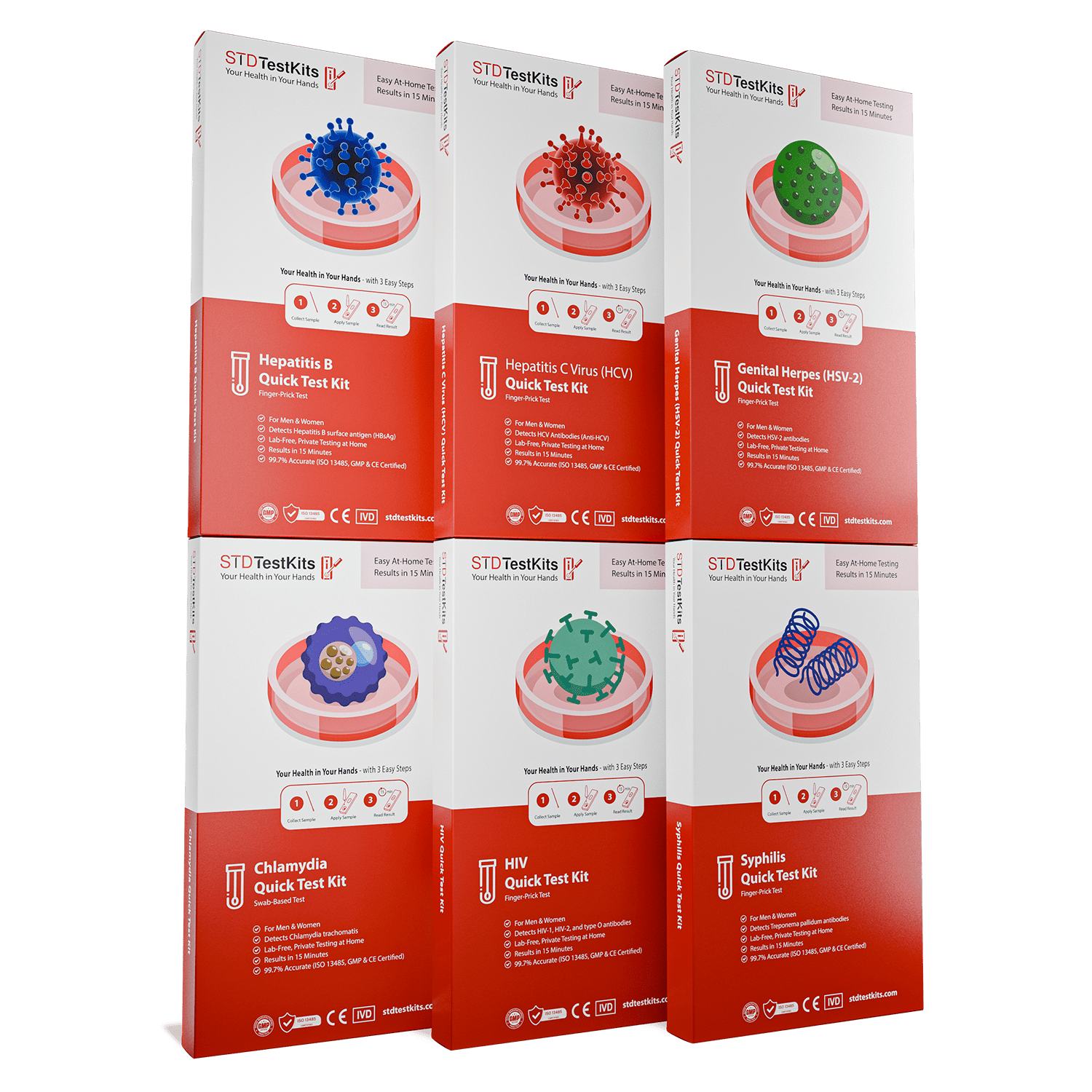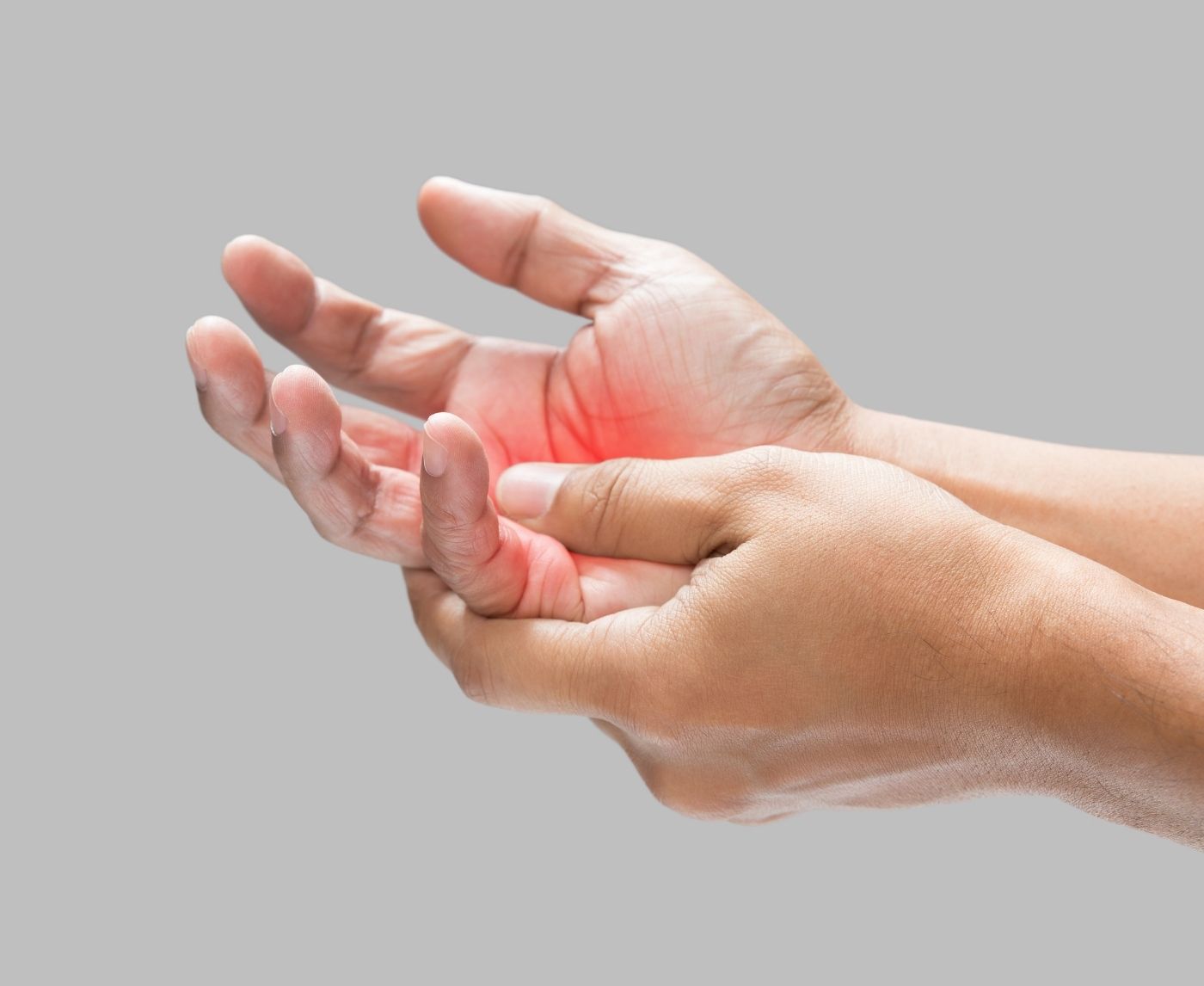Can You Get an STD from Hands Alone?
Quick Answer: Heat rash and some STDs can look nearly identical, especially in early stages. If the rash lasts more than a few days, spreads, blisters, or shows up after sex, it may be time to test for an STD like herpes, syphilis, or HPV.
This Isn’t Just Sweat, And Here’s Why
Heat rash, also known as miliaria, happens when sweat ducts get blocked, usually from friction, tight clothing, or, yeah, grinding skin-on-skin in hot weather. It’s common in summer, post-workout, or after a weekend of sweaty sex and zero airflow.
But some STDs can present almost the same way. Herpes can start as tiny red bumps or clusters that people mistake for irritation. Syphilis may appear as painless sores or a subtle rash on the torso or groin. HPV can show up as small flesh-colored bumps, often mistaken for razor burn or heat rash, especially in early stages.
The result? A lot of people shrug it off as “probably just sweat”, and never test. That delay can spread infection to others or allow symptoms to worsen. One small rash doesn’t always mean panic, but ignoring it entirely can come back to bite you (and your partner).
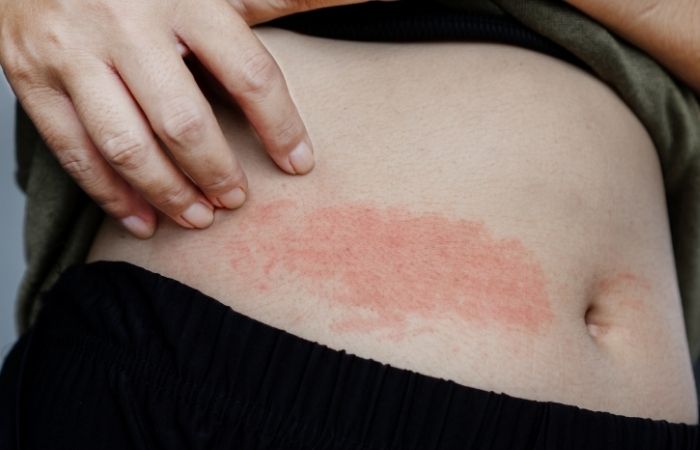
People are also reading: Trichomoniasis vs Prostatitis: What’s Really Causing Your Symptoms?
Heat Rash vs. Herpes vs. HPV: What It Actually Looks Like
If you’re staring at a rash in the mirror wondering what it means, you’re not alone. Here’s a breakdown of what each condition typically looks and feels like, so you can stop guessing and start knowing.
Table 1. Not all rashes are created equal. Heat rash usually resolves quickly, STDs don’t. Timing, texture, and sensation matter.
“I Thought It Was Heat Rash. It Was Herpes.”
Lucas, 28, noticed the rash a couple of days after a music festival. “I figured it was from sweating in those nylon shorts all day,” he said. The bumps were red, slightly itchy, and clustered near his groin. They didn’t hurt much, so he wrote it off as heat rash, or maybe an ingrown hair.
But five days later, the area burned when he peed, and some of the bumps developed little blisters. A quick Google search turned his stomach. He booked a same-day clinic appointment and got tested for herpes. The result? Positive.
“I’d been tested before, but they never mentioned herpes wasn’t part of the standard panel,” he said. “I wish I’d known that earlier.”
Lucas’s story isn’t rare. Many people assume a rash that doesn’t look “dramatic” can’t be serious. But if it lingers, spreads, blisters, or just shows up at the wrong time, it deserves a second look. And a test.
When to Worry: Rash Red Flags That Might Mean an STD
So how do you know if your rash is just the result of sweat and friction, or something that needs medical attention (and maybe a test)? This table breaks it down in plain language:
Table 2. Not all rashes need panic, but some need action. Timing, texture, and symptoms are key.
If your gut says something’s off, even if it “just looks like sweat”, listen to it. A discreet Combo STD Home Test Kit checks for the most common infections, including herpes, syphilis, and HPV, all without leaving your house.
Your skin is trying to tell you something. Don’t ignore it. Don’t guess. Get tested.
Misdiagnosed: When It’s Not Just a Skin Thing
One of the biggest issues with skin-related STDs? They don’t always look “serious.” No ulcers, no pus, no bleeding. Just a few bumps. Maybe a little itch. So doctors, and patients, chalk it up to irritation, sweat, or an allergic reaction.
We’ve seen herpes written off as jock itch. Syphilis mistaken for eczema. Even HPV passed off as skin tags. And when you’re young, active, or just had a rough waxing session, it’s easy to believe the rash is “just one of those things.”
But STDs don’t care about convenience. They show up when they want, and they don’t always scream. That’s why skin symptoms deserve the same attention you’d give to pain, discharge, or bleeding. Especially if they appear after a new partner or risky encounter.
Can Heat Rash and an STD Happen at the Same Time?
Absolutely. This isn’t an either-or situation. You can absolutely have both. Sweat and friction from sex can cause heat rash, sure, but if your skin’s already irritated, it’s more vulnerable to infection too.
Let’s say you hook up at a pool party. You’re sweaty, maybe didn’t shower right away, there was some skin-on-skin grinding, and boom, a few bumps show up. But that encounter also involved oral sex with no protection. Now you’re left wondering: was it heat? Or something else?
The answer might be both. And that’s why it’s smart to test after any new exposure, especially if symptoms don’t clear within a few days. If a partner tests positive, or if you start to notice recurring symptoms, don’t assume it’s just heat irritation. It could be your body raising a red flag.
What If I’ve Already Had Sex With Someone Since the Rash?
First: take a breath. If it was heat rash, there’s no harm done. But if it was an STD, like herpes, HPV, or syphilis, you may have passed it on unknowingly. Most of these infections are spread through skin-to-skin contact, not just fluids. That includes rubbing, grinding, oral, even sharing towels in some cases.
The best move now? Get tested and talk to your partner. If you're positive, they can get checked early, before symptoms even show up. It’s not about shame. It’s about being real with each other. Because no one deserves to stay in the dark when it comes to their health.
You’re Allowed to Ask Questions About Your Skin
Skin stuff is easy to ignore. A red bump here, a patch of dryness there. But if it came after sex, or didn’t heal with time and airflow, it might be something more. You’re not overthinking it. You’re paying attention. That’s what care looks like.
And the good news? You don’t have to wait in a clinic or explain yourself to five people. You can test at home, in private, and on your own terms. The Herpes Test Kit or full Combo STD Home Test Kit covers the top skin-related STDs discreetly and accurately.
Your rash might be nothing. Or it might be the clue your body’s giving you. Either way, you deserve to know.
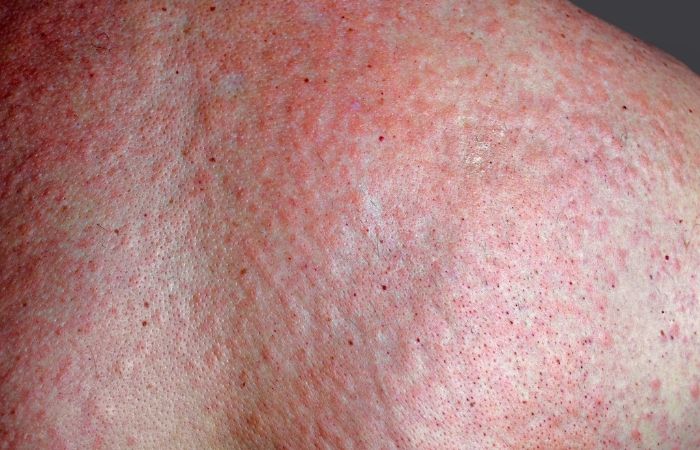
People are also reading: How (And Why) Gay Men Can Advocate for Better STD Testing
Why We Blow Off Rashes, Until We Can’t
Let’s be honest, no one wants to stare too long at their own groin in a mirror. So when a rash shows up down there, we tell ourselves it’s no big deal. “It’s the new detergent.” “Probably those tight jeans.” “I definitely shaved too close.” And hey, sometimes that’s true.
But rashes in the genital area come with baggage. There’s fear. Shame. That moment of panic you feel when Google auto-suggests “herpes images.” So we downplay it. We wait it out. We wait too long.
The truth? Most people who get diagnosed with an STD rash didn’t ignore it because they didn’t care, they ignored it because they didn’t want it to be real. That’s human. That’s normal. But waiting doesn’t make it go away. Testing, on the other hand, gives you clarity, and with clarity comes relief, treatment, and peace of mind.
So if something doesn’t feel right, don’t wait until it gets worse or spreads. You’re not overreacting. You’re just taking care of yourself, and that’s always the right call.
Rash Roulette: STD, Sweat, or Something Else?
Not all groin-area rashes are STDs, but many STD rashes get dismissed as “probably nothing.” Here’s how common causes stack up based on their symptoms, timing, and what usually triggers them:
Table 3. If your rash isn't following the usual script, it's time to stop guessing. Sweat fades. STDs don’t.
FAQs
1. Can a heat rash really look like an STD?
Definitely. Herpes, syphilis, and HPV can all show up as tiny bumps, redness, or a subtle rash, especially in early stages. It’s not always textbook blisters or painful sores. That’s what makes it tricky. If you’ve got a rash that sticks around longer than sweat usually does, don’t guess, test.
2. How long should I wait before worrying about a rash?
Give it a couple of days. If it fades fast and doesn’t spread or change, it might just be irritation or heat. But if it’s still hanging around after a week, or getting worse, that’s your cue to pay attention.
3. What if it started right after sex, but I’m not itchy?
Lack of itching doesn’t rule anything out. HPV and early syphilis often show up as painless bumps or sores. The timing matters more than the discomfort. If it came after sex, it’s worth checking out.
4. I shaved before sex, could that cause this?
Sure can. Razor burn and friction bumps are real. But here’s the kicker: if you were also exposed to something during sex, a shaved area is more vulnerable. So yes, irritation happens, but don’t let that be the only explanation you accept.
5. Does herpes always blister?
Not always. Some outbreaks are super mild, just a few red spots that don’t fully blister. You might not even know it’s herpes unless you test while it’s active. That’s why timing matters when testing for HSV.
6. What does an STD rash feel like?
It depends. Herpes may sting or burn. HPV usually doesn’t feel like anything. Syphilis? A painless sore. The big clue is less about how it feels, and more about how long it’s been there, and when it showed up.
7. Could it be heat rash and an STD at the same time?
Absolutely. One doesn’t cancel out the other. Heat can cause a rash from sweat and friction, while an STD could show up at the same time, especially if sex was part of the equation. It’s not either-or.
8. Can I spread something even if I think it’s just heat rash?
If it’s an STD? Yes. Herpes, syphilis, and HPV all spread through skin contact, rubbing, oral, even foreplay. If you’re not sure what that rash is, err on the side of caution and pause sex until you know.
9. Do I have to tell a partner if I’m not diagnosed yet?
You don’t have to sound alarms, but you can say, “Hey, I noticed something weird and I’m getting it checked out.” That’s honest and respectful, and most decent people will appreciate the heads-up.
10. Is it overreacting to test for STDs just because of a rash?
Not at all. It’s one of the smartest reasons to test. Skin is your first line of defense, if it’s acting up after a hookup, that’s your body trying to tell you something. You’re not overthinking. You’re owning your health.
Still Not Sure? That’s Exactly Why You Test
If the rash came and went, or it’s still lingering and you’re not sure what to think, this is your sign to stop guessing. You don’t need to panic, but you also don’t need to sit in silence wondering what’s going on with your skin.
STD skin symptoms are tricky, but they’re not invisible. The moment you start to feel that gut instinct kick in, the “what if?” that won’t go away, you’re already doing the right thing by paying attention.
Order a Combo STD Home Test Kit or a specific Herpes Rapid Test Kit. Test quietly, privately, and without delay. You deserve peace of mind, whether it’s just sweat or something more.
How We Sourced This Article: We reviewed over 15 reputable sources, including CDC guidance, dermatology journals, and real case studies to help differentiate heat rash from skin-related STDs. Every fact and symptom described here is rooted in current medical literature or expert-reviewed health content. Below, you’ll find some of the sources we relied on most heavily.
Sources
1. Heat‐related Illnesses , CDC: Heat Rash Symptoms & Prevention
2. Sexually Transmitted Disease (STD) Symptoms , Mayo Clinic
3. Skin Rash vs. Herpes Rash , Healthline
4. Skin Rash and Lesions – STI Guidelines Australia
5. Herpes-Like Conditions: When It Looks Like Herpes but Isn’t , Health.com
About the Author
Dr. F. David, MD is a board-certified infectious disease specialist focused on STI prevention, diagnosis, and treatment. He blends clinical precision with a no-nonsense, sex-positive approach and is committed to expanding access for readers in both urban and off-grid settings.
Reviewed by: N. Elston, NP, AAHIVS | Last medically reviewed: September 2025
This article is for informational purposes and does not replace medical advice.




